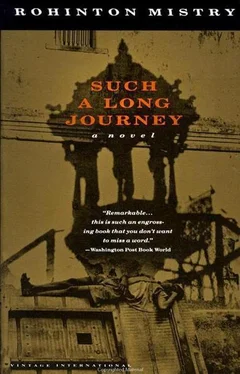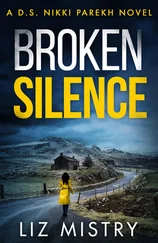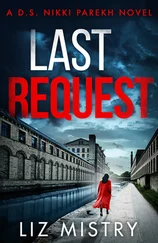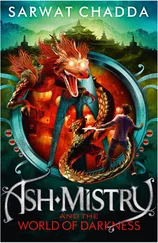The sea was steadily working its way to high tide. The two men selected a dry flat boulder to sit. ‘Such a beautiful place,’ said Gustad.
‘Yes, especially this part of Bandra. But the buggers have plans for reclamation and development.’
‘Roshan would really enjoy it. When we go to Chaupatty or Marine Drive sometimes, she loves to sit and watch the waves.’
Now and again, the salt spray touched their faces lightly, like the woman’s errant veil had touched Gustad’s cheek. After a while they had to pick another rock. ‘The sea is pushing us back,’ said Malcolm.
They talked fondly of the old days, of college, and the crazy old professors and padres. Gustad said he had never forgotten how kind Malcolm’s family had been to him, welcoming him in their home every evening, letting him share the music, even offering him a place to study. They tried to fill in for each other the lacunae in the scanty outlines exchanged earlier at Crawford Market. But to reclaim suddenly the gaping abyss which had swallowed up time was well-nigh impossible. They had to be content with wisps and strands that came to hand as they groped or stumbled their way through the vaults of memory.
‘That sonata you used to play with your father,’ said Gustad. ‘Da dee da da dee dum, Ta ta tum, Ta ta tum, Ta ta tum…You remember it?’
‘Of course,’ said Malcolm without hesitation. ‘Last movement of César Franck’s Sonata for violin and piano. In A. It was Daddy’s favourite.’
‘Mine, too,’ said Gustad. ‘Sometimes you two played it when it was getting dark in the evening. Before the lights came on. It sounded so beautiful, tears would almost spring to my eyes. I still cannot decide exactly whether it made me feel sad or happy. So difficult to describe.’ So difficult. Like Tehmul, all of us. Even with proper tongues, words are hard to find.
‘You won’t believe this,’ said Malcolm, ‘but after Daddy’s stroke, in such bad condition that he couldn’t hold his violin or remember his own name, this sonata was always in his head. He could only make sounds with his mouth, no speech. But he would keep humming the last movement.’
Malcolm whistled the theme as Gustad smiled encouragingly. ‘You know, I used to love to see your father put rosin on the bow, his face was always frowning with concentration when he did that. Then he would start to play, his bow moving up and down with so much life and power — gave me a strange feeling. As if he was searching desperately for something, but always disappointed. Because the piece ended before he found it.’
Malcolm nodded vigorously, he understood exactly. Gustad continued: ‘And the funny thing is, my father had the same kind of look in his eyes. Sometimes, when he was reading — a kind of sadness, that the book was finishing too soon, without telling him everything he wanted to know.’
‘That’s life,’ said Malcolm. The encroaching waves made them move again. Gradually, their conversation shifted to the present, to politics and the state of the nation. ‘Look at it. Indira has visited every country in Europe, they all say they sympathize. But nobody does a damn thing to make Pakistan behave decently. What is left but war?’
‘That’s true. This Refugee Relief Tax is terrible,’ said Gustad. ‘It’s killing the middle class.’ He described how, working at the bank, he could see the trend: more and more people had to draw on their savings. Then he asked what it was like to work for the municipality.
‘Very boring,’ said Malcolm. ‘Not worth talking about.’ He looked at his watch. ‘Ready to go?’
But the rush of the approaching tide, the blue-pink sky filled with comforting white shapes, the dancing foam and sea-glistened rocks, the touch of salty breezes on his face: all this was working to bestow gently upon Gustad a serenity he had not known for a very long time. He decided to stay. Malcolm had to leave for a piano lesson, but they promised to keep in touch, and shook hands on that. He thanked Malcolm for bringing him to Mount Mary; Malcolm replied it was his pleasure.
Alone, Gustad gazed at the horizon. There, the sea was calm. The tidal hustle and bustle could only be perceived near the shore. How reassuring, the tranquillity at the far edge, where the water met the sky. While the waves crashed against his rock. He felt an intense — what? joy? or sadness? did it matter? Like the sonata. Or dawn in the old days, the rising sun, its rays streaming happy golden tears into the compound, the sparrows chirping in the solitary tree.
The sun sank in the ocean, its journey done for the day. And all things that mattered in life were touched by this sweet, sad joy. One after another he remembered them. The workshop, the cheerful sound of tools, but also the silence of the end of day. Rides in his father’s four-horse carriage with the shiny brass lamps, it did not matter where to, for it was magic just to go clip-clop, until the ride ended and the horses were led away to the stable. Pappa’s wonderful parties, the food and music, the clothes, the people, the toys. And yet, always, at some point in the evening, the thought would surface — that the food would be consumed, the guests would leave, the music would stop playing, then he would have to go to bed and the lights switched off.
The opening bars of the sonata continued to obsess him, and the tears he could not permit now scalded his eyes. A wave touched the tip of his shoe, barely wetting it. The next one soaked both toes. If a person cried here, by the sea, he thought, then the tears would mix with the waves. Salt water from the eyes mixing with salt water from the ocean. The possibility filled him with wonder. He stood watching till the sea covered his rock. Then he followed the directions Malcolm had left him to get to Bandra station.
Later, as he emerged at Grant Road to walk home, the word came to him. ‘Supercalifragilisticexpialidocious.’ He repeated it softly. He would amuse Dinshawji with it tomorrow. Make up for missing today’s visit.
Dilnavaz answered the door without checking the peephole, as it was Gustad’s time to return from Parsi General. She was startled by the bearded man. When he introduced himself as Ghulam Mohammed, her first impulse was to slam the door in his face, lock and bolt it from inside.
‘Mr. Noble, please?’
‘He is out.’ Such everlasting woes that bhustaigayo Major dumped on our heads. When will it end? ‘He has gone to hospital to visit a very sick friend.’ Not that I need to explain to this sataan. But maybe he will feel sorry. If he has a heart.
‘I will wait in the compound.’ Good, she thought, don’t want him in my house. How dare he come here so shamelessly, after the things he did to us.
But she changed her mind: ‘You can sit inside.’ That way, I can warn Gustad at the door.
‘I am grateful. Thank you.’
She stayed in the kitchen, casting nervous glances into the front room. If she could only tell the black-bearded thief exactly what she thought of him. He smiled politely towards the kitchen door, curious about the black-out paper on the ventilators and the glass everywhere.
‘GustadGustadGustad,’ Tehmul yelled through the window. ‘PleasepleaseGustadplease.’
‘Excuse me,’ said Ghulam Mohammed. ‘I think someone is asking for Mr. Noble.’
She went to the front. ‘Yes?’
‘GustadGustadplease.’
‘Gone out.’
He scratched his armpit, deliberating, then remembered the rest of his message. ‘Phonephonephone. Veryimportantphone.’
‘Miss Kutpitia sent you?’ Tehmul nodded, using both hands under his arms like claws. ‘Stop it!’ she said, and the hands dropped. ‘Say that Gustad will come later.’ Cannot leave this black-bearded scoundrel alone. But who can be phoning on Sunday?
Читать дальше












